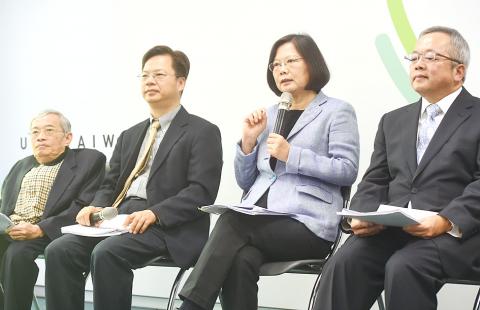The incoming administration is moving to establish a new quasi-sovereign wealth fund with local and overseas cash to finance emerging industries, a top adviser to president-elect Tsai Ing-wen (蔡英文) said yesterday.
According to a plan she is considering, the government would be the largest shareholder in the fund, with ownership at less than 50 percent, while the rest would be comprised of local and foreign investors, said Kung Ming-hsin (龔明鑫), Tsai’s top adviser on industry policy.
The fund would help nurture the development of key industries such as biotechnology and smart machinery, Kung said.

Photo: Chien Jung-fong, Taipei Times
“There is a lot of money in Taiwan, but people are just collecting fixed-interest payments,” said Kung, who is also vice president of the Taiwan Institute of Economic Research (台灣經濟研究院).
“An innovative financing mechanism can make full use of the local excess savings,” he said.
Tsai, who is to take office on May 20 after winning in a landslide in January’s election, campaigned on fostering new industries as economic growth slumps from a global trade slowdown.
The nation is facing increasing pressure to find new engines for growth as Chinese firms become more competitive and demand weakens in the electronics sector, its key export.
The new leadership hopes to keep central government deficit at less than 3 percent of GDP, so it needs to find more innovative ways to fund new industries beyond selling debt, Kung said.
The proposed fund’s investments would focus on five areas highlighted by Tsai’s campaign: “green” energy, biotechnology, national defense, Internet of Things and smart machinery.
While the fund might also acquire fledgling businesses, unlike Singaporean sovereign wealth fund Temasek Holdings Pte, it would not buy large companies.
Kung declined to comment on the size of the fund.
The new company might hire foreign managers, Kung added.
The Cabinet-level National Development Council said in July last year that it would consider forming a sovereign wealth fund, but added that it does not have to include foreign-exchange reserves.
Council Deputy Minister Huan Lin (林桓) this week said exploratory research conducted by the current administration would be passed to Tsai’s government if need be.
The nation’s economy grew 0.75 percent last year, the least since 2009, as exports shrank over the past 12 months.
Local technology firms have declined as demand for PC hardware fell, while those in other nations moved into Internet services.
The five worst performers in Morgan Stanley’s 106-member Asia-Pacific Infotech Index last year came from Taiwan.

AIR SUPPORT: The Ministry of National Defense thanked the US for the delivery, adding that it was an indicator of the White House’s commitment to the Taiwan Relations Act Deputy Minister of National Defense Po Horng-huei (柏鴻輝) and Representative to the US Alexander Yui on Friday attended a delivery ceremony for the first of Taiwan’s long-awaited 66 F-16C/D Block 70 jets at a Lockheed Martin Corp factory in Greenville, South Carolina. “We are so proud to be the global home of the F-16 and to support Taiwan’s air defense capabilities,” US Representative William Timmons wrote on X, alongside a photograph of Taiwanese and US officials at the event. The F-16C/D Block 70 jets Taiwan ordered have the same capabilities as aircraft that had been upgraded to F-16Vs. The batch of Lockheed Martin

GRIDLOCK: The National Fire Agency’s Special Search and Rescue team is on standby to travel to the countries to help out with the rescue effort A powerful earthquake rocked Myanmar and neighboring Thailand yesterday, killing at least three people in Bangkok and burying dozens when a high-rise building under construction collapsed. Footage shared on social media from Myanmar’s second-largest city showed widespread destruction, raising fears that many were trapped under the rubble or killed. The magnitude 7.7 earthquake, with an epicenter near Mandalay in Myanmar, struck at midday and was followed by a strong magnitude 6.4 aftershock. The extent of death, injury and destruction — especially in Myanmar, which is embroiled in a civil war and where information is tightly controlled at the best of times —

China's military today said it began joint army, navy and rocket force exercises around Taiwan to "serve as a stern warning and powerful deterrent against Taiwanese independence," calling President William Lai (賴清德) a "parasite." The exercises come after Lai called Beijing a "foreign hostile force" last month. More than 10 Chinese military ships approached close to Taiwan's 24 nautical mile (44.4km) contiguous zone this morning and Taiwan sent its own warships to respond, two senior Taiwanese officials said. Taiwan has not yet detected any live fire by the Chinese military so far, one of the officials said. The drills took place after US Secretary

US President Donald Trump yesterday announced sweeping "reciprocal tariffs" on US trading partners, including a 32 percent tax on goods from Taiwan that is set to take effect on Wednesday. At a Rose Garden event, Trump declared a 10 percent baseline tax on imports from all countries, with the White House saying it would take effect on Saturday. Countries with larger trade surpluses with the US would face higher duties beginning on Wednesday, including Taiwan (32 percent), China (34 percent), Japan (24 percent), South Korea (25 percent), Vietnam (46 percent) and Thailand (36 percent). Canada and Mexico, the two largest US trading